- Home
- Richard Powers
Bewilderment Page 2
Bewilderment Read online
Page 2
“Actually? Your mother’s favorite bird was the one in front of her.”
The answer agitated him. Our curious boy, as strange as anyone. Weighed down by the world’s history, before he even learned to talk. Six going on sixty, Aly said, a few months before she died.
“But the robin was the national bird, for her and me. It kept things special. We just had to say the word, and life got better. We never thought of naming you anything else.”
He bared his teeth. Did you have any idea what being a Robin is like?
“What do you mean?”
I mean, at school? At the park? Everywhere? I have to deal with it, every day.
“Robbie? Listen to me. Are kids bullying you again?”
He closed one eye and pulled away. Does the entire third grade being a total jerk-face count?
I held out my hands, asking forgiveness. Alyssa used to say, The world is going to take this child apart.
“It’s a dignified name. For men and women. You could do good things with it.”
On some other planet, maybe. A thousand years ago. Thanks again, guys.
He gazed into his microscope’s eyepiece, avoiding me. The note-taking grew diligent. Someone looking in from outside might have thought his research was real. In a confidential report, his second-grade teacher had called him slow but not always accurate. She was right about the slow, wrong about the accurate. Given time, he’d converge on more accuracy than his teacher could imagine.
I went out on the deck to breathe in the trees. A tract of forest ran in all directions. Five minutes later—it must have felt an eternity to him—Robin came out and slipped underneath my arm.
Sorry, Dad. It’s a good name. And I’m okay with being . . . you know. Confusing.
“Everyone’s confusing. And everyone’s confused.”
He put a sheet of paper into my hand. Check it out. What do you think?
From the upper left, a colored-pencil bird, in profile, looked toward the center of the page. He’d drawn it well, down to the streaked throat and white splotches around the eye.
“Well, look at that. Your mother’s favorite bird.”
How about this one?
A second bird in profile looked back from the top right. This one, too, was unmistakable: a raven with its wings tucked in, like a tuxedoed man pacing with his hands behind his back. My family name derived from Bran—raven in Irish. “Nice. From the Mind of Robin Byrne?”
He took the sheet back and appraised it, already planning slight corrections. Can we print up some stationery from this when we get back? I really, really need some stationery.
“This could happen, Birthday Boy.”
I TOOK HIM TO THE PLANET DVAU, about the size and warmth of ours. It had mountains and plains and surface water, a thick atmosphere with clouds, wind, and rain. Rivers wore the rocks into great channels that ran the sediment down to rolling seas.
My son jittered, taking it in. It looks like here, Dad? It looks like Earth?
“A little.”
What’s different?
The answer wasn’t obvious, on the reddish rocky coast where we stood. We turned and looked. Across the entire landscape, nothing grew.
It’s dead?
“Not dead. Try your microscope.”
He knelt and scooped some film from a tidal pool onto a slide. Creatures everywhere: spirals and rods, footballs and filaments, ribbed, pored, or lined with flagella. He could have taken forever, just sketching all the kinds.
You mean, it’s just young? It’s only getting started?
“It’s three times older than the Earth.”
He looked around the blighted landscape. Then what’s wrong? For my boy, large creatures wandering everywhere were a God-given right.
I told him Dvau was almost perfect—the right place in the right kind of galaxy, with the right metallicity and low risk of annihilation from radiation or other fatal disturbances. It revolved at the right distance around the right kind of star. Like Earth, it had floating plates and volcanoes and a strong magnetic field, which made for stable carbon cycles and steady temperatures. Like Earth, it was showered with water from comets.
Holy crow. How many things did Earth need?
“More than a planet deserves.”
He snapped his fingers, but they were too rubbery and small to make a sound. Got it. Meteors!
But Dvau, like Earth, had large planets in a farther orbit shielding it from extreme bombardment.
Then what’s wrong? He seemed about to cry.
“No large moon. Nothing nearby to stabilize its spin.”
We lifted into near orbit and the world wobbled. We watched as the days changed chaotically and April blinked into December, then August, then May.
We watched for millions of years. Microbes bumped up against their limits, like a float thumping a dock. Every time life tried to break loose, the planet twirled, beating it back down to extremophiles.
Forever?
“Until a solar flare burns away its atmosphere.”
His face made me kick myself for telling him this one too soon. It’s cool, he said, faking bravery. Kind of.
Dvau ran barren all the way to the horizon. He shook his head, trying to decide whether the place was a tragedy or a triumph. He looked at me. When he spoke, it was the first question of life, everywhere in the universe.
What else, Dad? Where else? Show me another one.
THE NEXT DAY, WE TOOK to the woods. Robin was wired. Nine, Dad. I get to ride in front! The law finally freed him from his safety seat in back. He’d waited for the front-seat view his whole life. Geez. Tons nicer, up here.
Fog clotted in the mountain folds. We drove through the little town that spread two buildings deep along both sides of the parkway: hardware store, grocery, three barbeque pits, inner tube rentals, outfitters. Then we entered half a million acres of recovering forest.
Before us, the remnant of a range once much higher than the Himalayas endured as rounded foothills. Lemon, amber, and cinnamon—the whole run of deciduous colors—flowed down the watersheds. Sourwoods and sweet gums covered the ridge in crimson. We rounded the bend into the park. Robin breathed out a long, astonished vowel.
We left the car at the trailhead. I carried a frame pack with our tent, sleeping bags, and stove. Slender Robin humped a day pack full of bread, bean soup, utensils, and marshmallows. He hunched forward under its weight. We headed over a ridge and back down toward a backcountry campsite that would be all ours tonight, a spot by the side of a stream that had once been all the planet I needed.
Fall’s extravagance ran through the Southern Appalachians. Rhododendrons plunged down ravines and crowded up rises in thickets that made Robin claustrophobic. Above that manic shrub layer rose a canopy of hickories, hemlocks, and tulip poplars just as lush.
Robin stopped every hundred yards to sketch a patch of moss or swarming ant nest. That was fine by me. He found an eastern box turtle feeding on a mass of ocher-colored pulp. It stood defiant, neck stretched, as we bent near. Fleeing wasn’t an option. Only when Robin dropped to his knees alongside it did the creature retract. Robin traced the Martian cuneiform letters spelling out unreadable messages on the dome of the creature’s shell.
We climbed up into the cove hardwood along a CCC path laid by unemployed boys not much older than Robin, back in the days before communal enterprise became the enemy. I crushed the star-shaped leaf of a sweet gum, half August jade, half October brick, and told him to sniff. He shouted in surprise. The scratched husk of a hickory nut shocked him even more. I let him chew the tip of a burgundy leaf and taste how sourwood got its name.
Humus tainted the air. For more than a mile, the trail ascended as steeply as a set of stairs. Spectral shadows followed us as we passed through the shedding broadleaves. We rounded an outcrop of mossy boulders, and the world changed from damp cove hardwood into drier pine and oak. It was a mast year. Acorns piled up across the trail. With each step, we scattered them.
Risin
g from the leaf duff in a bowl-shaped opening off the path was the most elaborate mushroom I’d ever seen. It mounded up in a cream-colored hemisphere bigger than my two hands. A fluted ribbon of fungus rippled through itself to form a surface as convoluted as an Elizabethan ruff.
Whoa! Whaaat . . . ?
I had no answer.
Farther down the trail he almost stepped on a black and yellow millipede. The animal writhed into a ball in my hand. I fanned the air above it toward Robin’s nose.
Holy crow!
“What does it smell like?”
Like Mom!
I laughed. “Well, yes. Almond extract. Which Mom sometimes smelled like when she was baking.”
He pressed my palm to his nose, traveling. That is so wild.
“That’s the word for it.”
He wanted more, but I laid the creature back in a patch of sedge and we carried on down the trail. I didn’t tell my son that the delicious smell was a cyanide, toxic in large doses. I should have. Honesty was very important to him.
A MILE OF DESCENDING TRAIL DROPPED US into a clearing by a rocky stream. Patches of white cascade gave way to deeper, open pools. Mountain laurel and stands of mottled sycamore flanked both banks. The site was more beautiful than I remembered.
Our tent was an engineering marvel, lighter than a liter of water and not much larger than a roll of paper towels. Robin pitched it himself. He fitted the thin poles, bent them into the tent’s eyelets, snapped the fabric clips onto the tensed-up exoskeleton, and hey presto: our home for the night.
Do we need the fly?
“How lucky do you feel?”
He felt pretty lucky. I did, too. Six different kinds of forest all around us. Seventeen hundred flowering plants. More tree species than in all of Europe. Thirty kinds of salamander, for God’s sake. Sol 3, that little blue dot, had a lot going for it, when you could get away from the dominant species long enough to clear your head.
Above us, a raven the size of an Oz winged monkey flew up into a white pine. “He’s here for the opening of Camp Byrne.”
We cheered, and the bird flew away. Then the two of us, after a stiff climb with packs on a day that had broken yet another all-time heat record by five degrees, opted for a swim.
A footbridge cut from a girthy tulip poplar crossed a chute in the cascades. Rocks on both sides were splattered with an action painting of lichen, moss, and algae. The creek was clear down to its stony bottom. We bushwhacked upstream and found a flat boulder. I steeled myself and eased into the rush. My doubtful son watched, wanting to believe.
The water shocked my chest and shoved me toward a tumble of rocks. What looked level from the shore was a whole rolling range of submerged micro-mountains. I plunged into the turbulence. My foot slid on a slick stone worn smooth by centuries of falling water. Then I remembered how to do this. I sat down in the torrent and let the chill river crash over me.
At his first touch of frigid current, Robin screamed. But the pain lasted only half a minute and his shrieks turned to laughter. “Keep low,” I called. “Crawl. Channel your inner amphibian.” Robbie surrendered to the ecstatic churn.
I’d never let him do anything so dangerous. He fought the current on all fours. Once he found his cascade legs, we worked our way to a spot in the middle of the surge. There we wedged ourselves into a rocky bowl and braced in the pummeling Jacuzzi. It felt like surfing in reverse: leaning back, balancing by constant adjustment of a hundred muscles. The film of water over the stones, the light that etched its rippled surface, and the weird fixed flow of the standing waves roaring over us where we lay in the frothy rapids mesmerized Robin.
The stream felt almost tepid now, warmed by the force of the current and our own adrenaline. But the water coiled like something wild. Downstream, the rapids dropped under orange trees that arched in from both banks. From behind us, upstream, the future flowed over our backs into the sun-spattered past.
Robin gazed at his submerged arms and legs. He fought against the warping, twisting water. It’s like a planet where the gravity keeps changing.
Black-striped fish the length of my pinkie swam up to kiss our limbs. It took me a moment to see they were feeding on the flakes of our sloughed skin. Robin couldn’t get enough. He was the main exhibit of his own aquarium.
We crab-walked upstream, legs splayed, arms patting for underwater handholds. Robin scuttled sideways from one cascade to another, playing at being a crustacean. Wedged into a new scoop of rocks, I inhaled the percolating foam—all the negative ions broken by the churn of air and water. The play of sensations elated me: the frothed-up air, the biting current, the free-falling water, a last swim together at the end of the year. And like some surge in the rocky stream, I lifted for a moment before crashing.
A hundred yards upstream, Alyssa tumbled feetfirst down this channel in a wet suit that fit her like skin. I anchored downstream to catch her, but she still yelped as the flow tossed her down the chutes. Her body bobbed toward me, small but mighty, swelling as it swept downstream, and just as my muscles reached to catch her, she passed right through me.
Robbie let go of his hold and scudded down the rapids. I stuck out an arm and he snagged it. He grappled to me and brought his eyes up to mine. Hey. What’s up?
I held his gaze. “You’re up. I’m down. Only a little, though.”
Dad! He jabbed with his free hand, waving it at the evidence all around us. How can you be down? Look where we are! Who gets this?
Nobody. Nobody in the world.
He sat down in the cascade, still hanging on to me, working it out. It took him no longer than half a minute. Wait. Were you here with Mom? Your honeymoon?
His superpower, really. I shook my head in wonderment. “How do you do that, Sherlock?”
He frowned and raised himself out of the water. Tottering in place, he surveyed the whole watershed with new eyes. That explains everything.
BACK AT CAMP, I FELT A CRAVING for current events. Urgent things were happening across the world that I knew nothing about. Notes from colleagues were piling up in my off-line in-box. Astrobiologists on five continents huddled in a scrum over the latest publications. Ice shelfs were breaking off Antarctica. Heads of state were testing the outermost limits of public gullibility. Little wars were flaring everywhere.
I pushed back against the informational DTs, while Robin and I shaved pine twigs for a fire. We’d strung our packs up on a wire between two sycamores where not even the fattening bears could reach them. With the fire blazing, our only responsibility in the whole world was to cook our beans and toast our marshmallows.
Robin stared into the flames. In a robotic monotone that would have alarmed his pediatrician, he droned, The good life. A minute later: I feel like I belong here.
We did nothing but watch the sparks, and we did that well. One last purple rib of sun lined the ridges to the west. The forested mountainsides, having inhaled all day long, now began to breathe back out again. Shadows flickered around the fire. Robin swung his head at every noise. His wide eyes blurred the line between thrill and fear.
Too dark to draw, he whispered.
“Yes,” I said, although he probably could have managed, even in the dark.
Gatlinburg used to look like this?
The question startled me. “Bigger trees. Much older. Most of these are younger than a hundred.”
A forest can do a lot in a hundred years.
“Yes.”
He squinted, sending all kinds of places—Gatlinburg, Pigeon Forge, Chicago, Madison—back to wilderness. I’d done the same thing, on my own worst nights after Alyssa died. But in the mind of this child, the one who’d kept me going, the wish seemed unhealthy. Every decent parent in the world would have argued him out of it.
Robin saved me the effort. His voice was still low, still robotic. But I saw his eyes spark as he studied the fire. Mom used to read poetry at night, to Chester?
Who knows how he leapt from one thought to another? I’d stopped trying to
trace him a long time ago.
“She did.” It had been Alyssa’s favorite ritual, long before I showed up on the scene. Two glasses of red wine, and she’d submit the homeliest beagle–border collie rescue that ever walked the Earth to her favorite stanzas.
Poetry. To Chester!
“I’d listen, too.”
I know, he said. But clearly, I didn’t count.
The embers spat, then settled again into reddish gray ingots. For a moment I worried that he’d ask me to name her favorite poems. Instead, he said, We should get another Chester.
Chester’s death had almost killed him. All the grief over Alyssa that he’d suppressed in order to protect me tore out of him when the crippled old beast gave up. The rages took over, and I let the doctors medicate him for a while. All he could think about was getting another dog. For a long time, I’d fought him off. Somehow, the idea traumatized me.
“I don’t know, Robbie.” I poked the cinders with a stick. “I don’t think there is another Chester.”
There are good dogs, Dad. Everywhere.
“It’s a lot of responsibility. Feeding, walking, cleaning up after it. Reading it poetry every night. Most dogs don’t even like poetry, you know.”
I’m very responsible, Dad. More responsible than I ever am.
“Let’s sleep on it, okay?”
He doused the fire in several gallons of water, to show how responsible he could be. We crawled into the two-man tent and lay faceup, side by side, no fly, just the lightest netting between us and the universe. The tops of trees waved in the Hunter’s Moon. A thought formed on his face as he studied their moving tips.
What if we hung a huge Ouija board upside down, above them? Then they could send us messages, and we could read them!
A bird started up in the woods behind our heads, another cryptic message no human would ever decode. Whip-poor-will. Whip-poor-will. I started to name it, but there was no need. The bird would not quit. Whip-poor-will. Whip-poor-will. Whip-poor-will. Whip-poor-will.
Robin grabbed my arm. It’s going nuts!
The bird looped its name into the cooling dark. We started to count together, under our breaths, but gave up when we reached one hundred and the bird showed no sign of flagging. That bird was still perseverating when Robin’s eyes started to close. I nudged him.

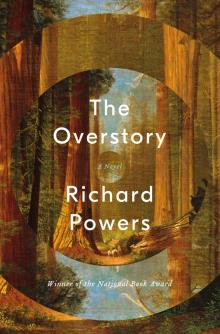 The Overstory
The Overstory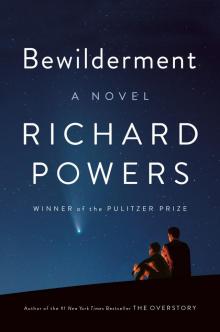 Bewilderment
Bewilderment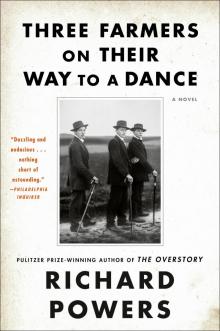 Three Farmers on Their Way to a Dance
Three Farmers on Their Way to a Dance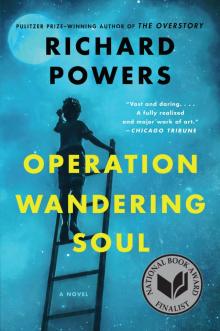 Operation Wandering Soul
Operation Wandering Soul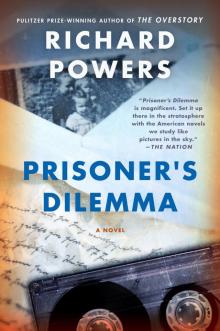 Prisoner's Dilemma
Prisoner's Dilemma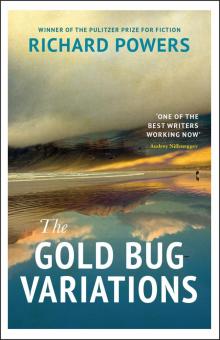 The Gold Bug Variations
The Gold Bug Variations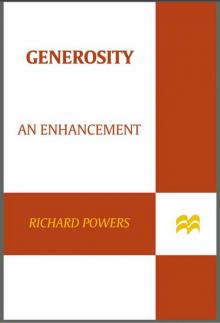 Generosity: An Enhancement
Generosity: An Enhancement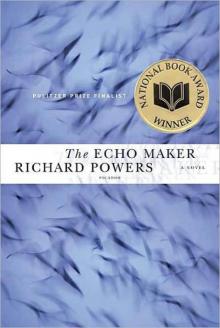 The Echo Maker
The Echo Maker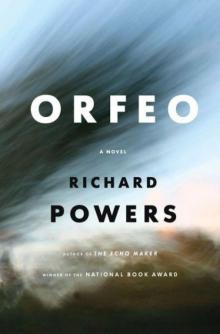 Orfeo
Orfeo The Time of Our Singing
The Time of Our Singing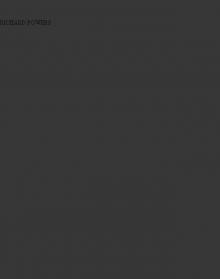 PLOWING THE DARK
PLOWING THE DARK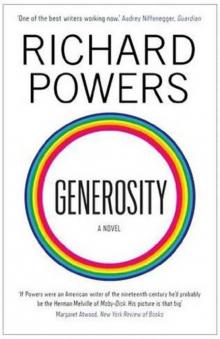 Generosity
Generosity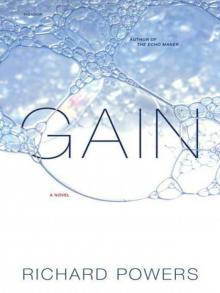 Gain
Gain